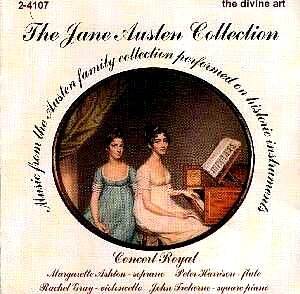The Jane Austen Collection
1. The Highland Laddie. Trad:
arr Joseph Haydn (1732 - 1809) [2.58]
2. The Yellow Hair'd Laddie. Trad: arr L.A.Kozeluch (1747 - 1818) [3.11]
3. .Peaty's Mill. Arr. Stephen Paxton [1.53]
4. Extract from"Sense and Sensibility" (1811) [1.13]
5. Andantino. Ignace Joseph Pleyel (1757 - 1831) [2.45]
6. Extract from "Sense and Sensibility" (1811) [1.14]
7. The Mansion of Peace. Samuel Webbe snr. (1740 - 1816) [3.43]
8. Time hath not Thinn'd. William Jackson (1730 - 1803) [3.19]
9. William. Joseph Haydn. arr. Thomas Billington (1754 - 1832) [2.32]
10. Extract from a letter from Jane to her sister Cassandra (5th September
1796) followed by Boulangeries (anon). [1.20]
11. Cymon and Iphigenia. Thomas Augustine Arne (1710 - 1778) [9.07]
12. Extract from a letter from Jane to her sister Cassandra (27th December
1808)
followed by Air des Ballets de la Caravane. A.E.M.Grètry (1741 - 1813)
[1.27]
13. The Wedding Day. James Hook ( 1746 - 1827) [4.23]
14. The Nightingale. Anonymous. [1.31]
15. Extracts from "Emma" (1816) [1.16]
16. The Shepherd's Song Joseph Haydn ( 1732 - 1809) [3.27]
17. Extract from a letter from Jane to her sister Cassandra (15th January
1796)
followed by The Irishman. Anonymous.
[2.25]
 Concert Royal.
Concert Royal.
Margarette Ashton (soprano); Peter Harrison (flute);
Rachel Gray (violoncello); John Treherne (square piano).
Recorded Westfield Farm, Sheriff Hutton, North Yorkshire. Oct 1999 and February
2000 DDD
 Divine Art Ltd. 2
-4107
[47.46]
Divine Art Ltd. 2
-4107
[47.46]
Divine
Art Record Company

This is a delightful idea for a recording. Divine Art, a label based in the
North East of England, has released this disc under the title of The Jane
Austen Collection with a sub-title Music from the Austen Family collection
performed on historic instruments. It attempts to reconstruct
a soirée such as might have been held in the house of a well-to-do
family in the late 18th and early 19th Centuries and the Austen family connection
comes from the music and writings included. These are pieces selected from
the collection of the hand-written and printed music that belonged to the
family and that are now preserved by the Jane Austen Memorial Trust.
A point that emerges strongly from reading Jane Austen and learning from
her writings of the times and milieu she lived in is the often overpowering
sense of boredom that must have affected her and her kind. Families like
the Austen's living in the country with a limited social circle and little
in the way of travel would have looked forward enormously to the occasional
musical evenings that brightened their otherwise repetitively tedious lives.
In those far-off days when entertainment by oneself or by one's peers was
the norm, some level of musical accomplishment was assumed - certainly of
the ladies. No doubt many of the men would decline to be more than listeners
(can you imagine Mr. Darcy obliging with a rendition for instance?), but
Jane and her kind everywhere would have had some level of musical training
and would be expected to contribute to the evening's offerings. The image
of a doting young man entranced by a young lady at a keyboard is a strong
one seen so many times in film or on television. What that purveyed image
is not likely to show is a young woman with an out of tune piano and a baritone
singing execrably. Jane Austen herself apparently practiced regularly before
breakfast but would never play in public.
The non-musical items in the programme are short readings - done splendidly
by the soprano Margarette Ashton - of two extracts from Sense and
Sensibility. In these Marianne firstly falls for Mr. Willoughby
and then subsequently is let down by him and, as young ladies did then, and
presumably still do today, overreacts as she bares her emotions. There are
extracts from two letters from Jane to her sister Cassandra in the second
of which she refers to the lack of a pianoforte and says "Yes, Yes, we shall
have one... as good as can be got for thirty guineas". The reading from
Emma tells of the mysterious arrival of an instrument for Jane Fairfax
- perhaps a case of fiction having a real life basis. The final extract is
another letter from Jane that alludes to a romantic interest in an Irishman.
These readings are linked to suitable pieces of music.
From the musical viewpoint, what is interesting is the glimpse we are given
of contemporary musical taste in provincial England. In the composers' names
Haydn, Grétry and Thomas Arne appear - Arne's Cymon and Iphigenia
with three arias and linked recitatives is the single extended piece - others
mean little if anything to us these days, and only Highland Laddie,
and perhaps Haydn's Shepherd's Song, would be widely recognised today.
The pieces are generally slight but pleasing, and doubtless part of their
appeal would have been their degree of accessibility for the amateur performer.
The performers themselves, Concert Royal, are excellent. With original
instruments which include a one keyed flute and a square piano joining a
soprano voice that is small but admirably suited to the repertoire the concept
succeeds. The well-recorded programme really does create images of the scene
that we are intended to imagine.
A recommendation then for an imaginative and enterprising CD - even though
it lasts less than 48 minutes.
Reviewer.
Harry Downey
See also MUSIC AND
JANE AUSTEN by Philip Scowcroft
